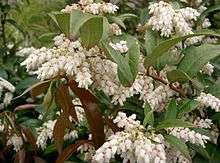Leucothoe axillaris
Leucothoe axillaris is a shrub native to the southeastern United States, with the common names swamp dog-laurel and coastal dog-hobble. It has been reported from Louisiana, Mississippi, Alabama, Florida, Georgia, North and South Carolina and Virginia. It grows on floodplains in coastal areas at elevations of less than 200 me (670 feet).[2][3]
| Leucothoe axillaris | |
|---|---|
 | |
| Scientific classification | |
| Kingdom: | Plantae |
| Clade: | Tracheophytes |
| Clade: | Angiosperms |
| Clade: | Eudicots |
| Clade: | Asterids |
| Order: | Ericales |
| Family: | Ericaceae |
| Genus: | Leucothoe |
| Species: | L. axillaris |
| Binomial name | |
| Leucothoe axillaris (Lam.) D. Don | |
| Synonyms[1] | |
|
Andromeda axillaris Lam. | |
Leucothoe axillaris is a branching shrub up to 2 m (7 feet) tall. Leaves are up to 8 cm (3.2 inches) long. Flowers are white, cylindrical, up to 8 mm (0.32 inches) long. Fruit is a dry capsule.[4][5][6]
.jpg)
Leucothoe axillaris is native to the southeastern United States
References
- The Plant List
- Flora of North America v 8 p 509
- Ingram, J. W. 1979. Leucothoe revisited (Ericaceae). Baileya 20: 141-145.
- Don, David. Edinburgh New Philosophical Journal 17(33): 159. 1834.
- Lamarck, Jean Baptiste Antoine Pierre de Monnet de. Encyclopédie Méthodique, Botanique 1(1): 157. 1783.
- Godfrey, R. K. & J. W. Wooten. 1981. Aquatic and Wetland Plants of Southeastern United States Dicotyledons 1–944. University of Georgia Press, Athens.
| Wikimedia Commons has media related to Leucothoe axillaris. |
This article is issued from Wikipedia. The text is licensed under Creative Commons - Attribution - Sharealike. Additional terms may apply for the media files.